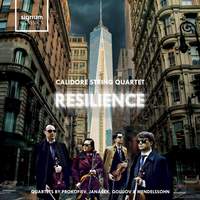Interview,
The Calidore Quartet on 'Resilience'
 The Calidore String Quartet may be a relatively new ensemble - named as one of BBC Radio 3's New Generation Artists for 2018 as part of the BBC's goals to nurture up-and-coming talents - but they're certainly not shy about making their mark. Their powerful début recording Resilience is, at least in part, a musical response to increasingly troubled times, and draws on four composers who each underwent different kinds of hardship in their lives and who gave expression to that anguish in their work.
The Calidore String Quartet may be a relatively new ensemble - named as one of BBC Radio 3's New Generation Artists for 2018 as part of the BBC's goals to nurture up-and-coming talents - but they're certainly not shy about making their mark. Their powerful début recording Resilience is, at least in part, a musical response to increasingly troubled times, and draws on four composers who each underwent different kinds of hardship in their lives and who gave expression to that anguish in their work.
The quartet's four members offer some insights into the inspiration behind this striking recording.
You’re by no means the only artists to react to the tumultuous reverberations of 2016 with a bold, frontal response; the last two years have seen quite a flourishing of music ‘for these distracted times’. Do you think social disruption and uncertainty, however uncomfortable, can actually act as a kind of stimulus or impetus to creativity?
Jeremy Berry (viola): In many cases, some of the greatest art ever created has been a reaction to social disruption and uncertainty. Finding ourselves in a time of anxiety and political division worldwide, we found it relevant to look back to composers who wrote during times of great difficulty. We chose these works on our album to show that music written even in the darkest of circumstances can still be filled with hope for the future and can be a source for uniting us together.
You’re nailing your political colours quite firmly to the mast with this album; do you worry that being seen to “pick sides” in a contentious and bitter debate might negatively affect how you’re viewed as artists?
Ryan Meehan (violin): We deliberately chose not to get caught up in party politics and dogma with the message of our album. Rather than focusing on Left vs. Right, Democrat vs. Republican, we were addressing the divide in our nation that citizens on either side of the political spectrum would all acknowledge. We hope to reach everyone with our music regardless of all the divisive forces facing our society these days, especially politics.
There are plenty of other quartets by composers facing tough times – war-buffetted Shostakovich springs especially to mind. What led you to single out these four works in particular?
Jeffrey Myers (violin): While selecting works for our new album we wanted to showcase the widest possible variety. In exploring the idea of resilience, we chose works in which the composers were experiencing a range of issues. From Mendelssohn dealing with the loss of his sister to Prokofiev lifting the spirits of the people during World World Two, music provides an outlet for our rage and at the same time our most inward struggles and feelings.
Why do you think composers so often turn to the string quartet – far more so than any other genre – to express deeply personal feelings?
Estelle Choi (cello): The ability to have four separate players that can be both independent and unified gives composers a powerful tool to give life to their own voices. Just as we encounter many perspectives and roles in life, each individual brings a different source of inspiration to the table to create a complete picture. While symphonies can bring great majesty and color on a large scale, the intimacy of string quartet allows for writing that conveys subtle and complex emotions.
However, at the drop of a hat, a quartet can become an entire orchestra moving as one in a wave of sonic power. Mendelssohn's Op. 80 string quartet is a great distillation of just that. The indescribable anguish and sorrow that he went through in losing his sister so suddenly becomes tangible and visceral in the turbulence of the outer movements where we as musicians must become the darkest, most ominous storm clouds filled with thunder and rage. But in the third movement, we are pulled into one of the most touching moments of tenderness and melancholy as Mendelssohn undoubtedly reflects on the memory of his sister. It is this impact that we believe draws composers to turn to the string quartet, to express the concepts that cannot be put into words.
Resilience is released tomorrow on Signum Classics, and features music by Janáček, Prokofiev, Golijov and Mendelssohn.
Available Formats: CD, MP3, FLAC, Hi-Res FLAC



